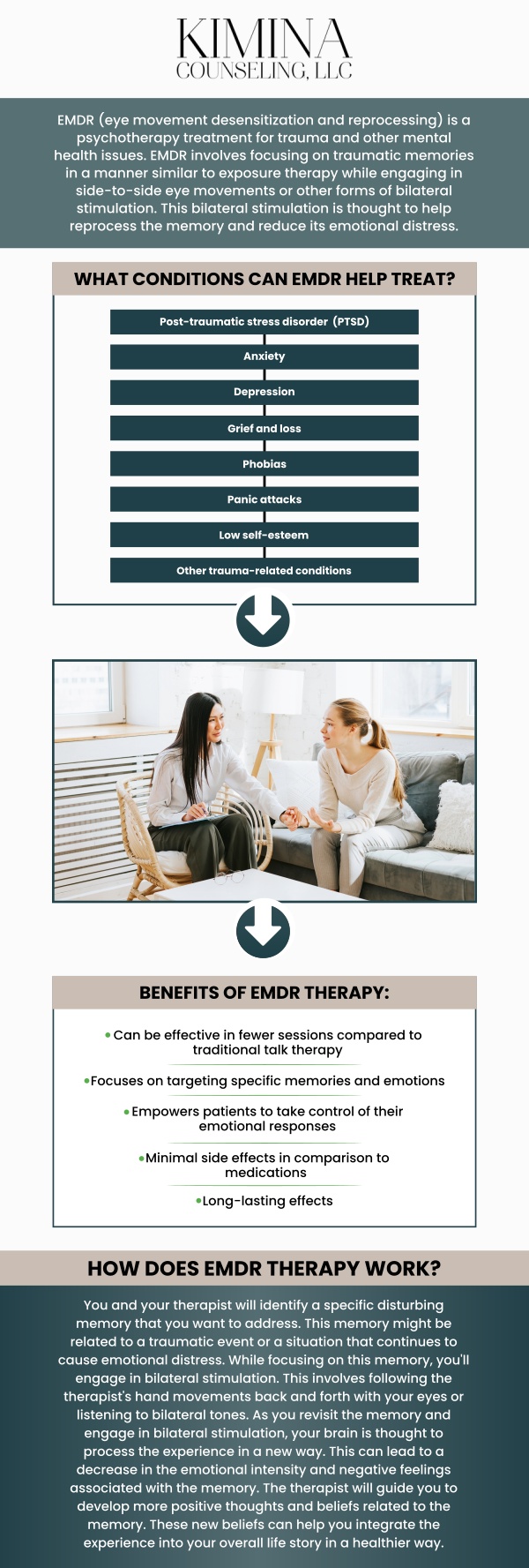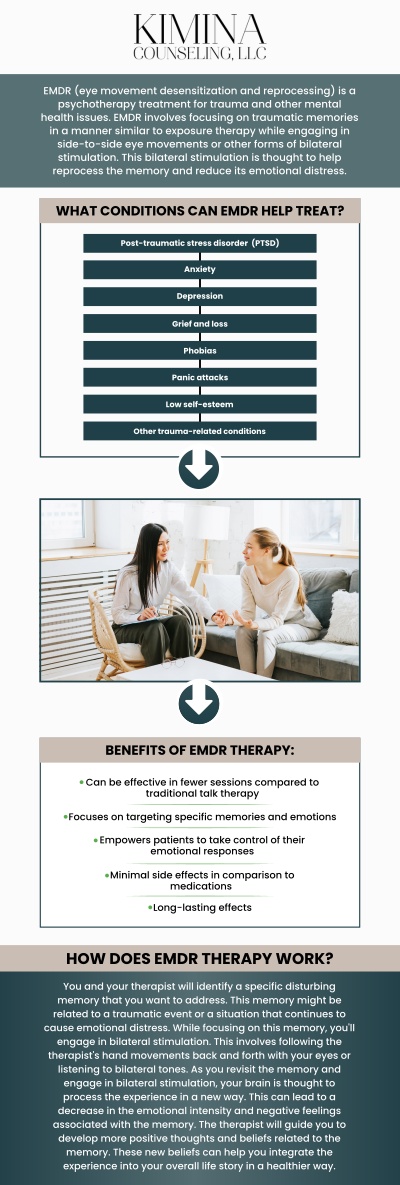Top EMDR Therapist in Auburn, MA
EMDR (Eye Movement Desensitization and Reprocessing) is a proven therapeutic technique used to help individuals process traumatic memories and emotional distress. At Kimina Counseling, LLC, Kimberly Sanchez, LMHC, and Amina Mazzara, LMHC, specialize in EMDR therapy to provide effective relief from trauma, PTSD, anxiety, and other emotional challenges. Our therapists offer a compassionate, safe environment where you can work through difficult experiences and regain control of your life with the help of EMDR therapy. For more information, contact us or schedule an appointment online. We are conveniently located at 7 Midstate Drive, Suite 202, Auburn, MA 01501.


Table of Contents:
What is the EMDR technique?
What types of conditions can EMDR therapy treat?
Who is a good candidate for EMDR therapy?
What is the success rate of EMDR therapy?
How do Kimberly Sanchez, LMHC, and Amina Mazzara, LMHC, personalize EMDR therapy for individual client needs?
At Kimina Counseling, LLC, we are committed to offering effective, research-backed therapies to support your mental health and healing journey. One of the specialized services we provide is Eye Movement Desensitization and Reprocessing (EMDR) therapy, a highly effective method designed to assist individuals in processing and recovering from traumatic experiences and troubling memories.
EMDR (Eye Movement Desensitization and Reprocessing) is a structured therapeutic approach designed to help individuals process and heal from traumatic events and distressing memories. This technique consists of eight phases that guide the person through a healing process aimed at reducing the emotional intensity of traumatic memories, helping them integrate these experiences more healthily.
Here’s an overview of the EMDR technique:
• History and Treatment Planning: The therapist begins by gathering information about the client’s history, symptoms, and specific traumas. This phase helps identify target memories that will be worked on during the therapy.
• Preparation: The therapist ensures the client is mentally and emotionally prepared for EMDR therapy. This may include establishing coping strategies and ensuring the client feels safe and comfortable throughout the process.
• Assessment: In this phase, the therapist helps the client identify the specific memory or trauma to be targeted. The client is asked to recall the memory, identifying the emotions, negative beliefs, and physical sensations associated with it.
• Desensitization: The core of EMDR therapy involves bilateral stimulation (commonly eye movements, but sometimes tapping or sounds) while the client focuses on the distressing memory. This helps the brain reprocess memory and reduce its emotional charge. The therapist guides the client through sets of eye movements or other forms of bilateral stimulation as the client revisits the memory, promoting cognitive and emotional healing.
• Installation: This phase helps the client replace negative beliefs with positive ones. After reducing the emotional charge, the therapist encourages the client to reinforce a positive self-belief related to the traumatic memory.
• Closure: At the end of each session, the therapist ensures the client returns to a state of emotional equilibrium, helping them feel calm and grounded. If the memory has not been fully processed, the therapist may plan additional sessions to continue the work.
• Re-evaluation: In subsequent sessions, the therapist checks in on the progress of the treatment, reprocessing any remaining distress or unresolved memories, and ensuring that the client’s emotional state has improved.
The EMDR technique is effective because it helps the brain process memories in a way that it couldn’t initially, reducing the emotional pain and negative beliefs associated with those memories. It’s widely recognized as one of the most effective therapies for trauma and is supported by extensive research.
Our therapists at Kimina Counseling, LLC follow the structured, eight-phase EMDR protocol, which includes history-taking, preparation, assessment, desensitization, installation, body scan, closure, and re-evaluation. This thorough approach ensures that therapy is tailored to your unique needs and delivered in a compassionate, client-centered manner.
EMDR therapy is highly effective in treating a wide range of conditions, particularly those related to trauma and emotional distress.
Some of the most common conditions that can be treated with EMDR include:
• Post-Traumatic Stress Disorder (PTSD): EMDR is well-known for its success in helping individuals process and heal from the effects of traumatic events, such as accidents, abuse, combat, or natural disasters.
• Anxiety and Panic Disorders: EMDR can help individuals reduce the emotional charge associated with anxiety-provoking memories, which can lead to a decrease in anxiety symptoms and panic attacks.
• Depression: By addressing past traumatic experiences that may contribute to negative thought patterns and emotional distress, EMDR can be an effective tool in managing depression.
• Phobias: EMDR is often used to treat specific phobias by helping individuals reprocess the traumatic memories or beliefs that fuel their fear responses.
• Grief and Loss: Individuals struggling with unresolved grief or complicated bereavement may find relief through EMDR, as it can help them process the pain and integrate the loss more healthily.
• Childhood Abuse or Neglect: EMDR is effective in treating the long-lasting emotional effects of physical, emotional, or sexual abuse, helping individuals work through trauma that may affect their adult life.
• Addiction: For some individuals, unresolved trauma or emotional pain may contribute to addictive behaviors. EMDR can help uncover the underlying emotional causes and support addiction recovery.
EMDR therapy is a versatile treatment option, with proven efficacy in treating these conditions and helping individuals regain control over their emotional well-being. At Kimina Counseling, LLC, we recognize that every client’s journey is unique. Our licensed therapists will work with you to determine if EMDR is the right approach for your needs and integrate it with other therapeutic techniques for the best possible outcomes.
At Kimina Counseling, LLC, we are dedicated to offering evidence-based treatments that support your path to healing and well-being. One such approach we provide is Eye Movement Desensitization and Reprocessing (EMDR) therapy. EMDR is a specialized form of psychotherapy designed to help individuals process and heal from traumatic experiences and distressing memories.
A good candidate for EMDR therapy is anyone who has experienced trauma or distressing life events and is struggling with emotional or psychological symptoms as a result. This includes individuals dealing with Post-Traumatic Stress Disorder (PTSD), anxiety, depression, phobias, or panic attacks caused by past traumatic experiences. EMDR is particularly effective for those who have experienced events such as childhood abuse, combat trauma, sexual assault, natural disasters, or serious accidents. Individuals who feel “stuck” in their healing journey or have not responded well to other forms of therapy may also benefit from EMDR.
Additionally, people who are open to a structured, experiential therapy process and are ready to address memories in a safe, supportive environment can be good candidates. EMDR therapy is not only for trauma survivors but can also be helpful for individuals with negative self-beliefs, unresolved grief, or those struggling with chronic pain linked to emotional trauma. Overall, anyone seeking to process and heal from past emotional wounds may find EMDR therapy to be an effective treatment option.
At Kimina Counseling, LLC, your safety and well-being are our top priorities. That’s why we start with a comprehensive evaluation by a licensed clinician to determine if EMDR is the best fit for your mental health needs and emotional readiness. From there, we work collaboratively with you to create a personalized treatment plan that ensures the best possible outcomes for your healing journey.
At Kimina Counseling, LLC, we are committed to providing evidence-based treatments to support our clients on their path to healing and recovery. One of the most effective therapies we offer for trauma and post-traumatic stress disorder (PTSD) is Eye Movement Desensitization and Reprocessing (EMDR).
EMDR therapy is highly effective in treating trauma-related disorders, with numerous studies demonstrating its success rate. Research suggests that around 77-100% of individuals with trauma-related symptoms, including those with Post-Traumatic Stress Disorder (PTSD), experience significant improvement or complete resolution of their symptoms after completing EMDR therapy. EMDR is particularly effective for individuals who have not responded well to traditional talk therapies, as it targets the brain’s processing of distressing memories, allowing for faster healing. Its structured approach helps individuals reprocess traumatic memories, reducing emotional charge and leading to long-lasting relief.
While the success rate of EMDR can vary depending on the individual and their specific condition, many patients experience substantial progress within 6 to 12 sessions. Factors such as the severity of the trauma, the client’s commitment to the therapy, and the therapist’s experience can influence the outcome. Overall, EMDR is recognized as a proven, evidence-based therapy for trauma and related mental health conditions, offering a high success rate for those seeking effective and swift emotional healing.
At Kimina Counseling, LLC, our experienced therapists are trained in EMDR and tailor therapy to each individual’s unique history and needs. We understand that everyone’s experience with trauma is different, and we are dedicated to helping you find the healing and resilience you deserve.
Kimberly Sanchez, LMHC, and Amina Mazzara, LMHC, personalize EMDR therapy for each client by first conducting thorough assessments to understand the unique challenges and emotional history of every individual. They take the time to learn about the client’s specific trauma, symptoms, and overall mental health needs, which allows them to tailor the EMDR process to address the root causes of distress. Their individualized approach ensures that the therapy targets the most relevant memories and experiences, helping clients process trauma at a pace that feels safe and manageable. Both therapists combine their extensive experience with a compassionate understanding, creating a supportive environment where clients feel comfortable and empowered throughout their healing journey.
Throughout the EMDR process, Kimberly Sanchez and Amina Mazzara adjust their therapeutic techniques to fit the specific emotional and psychological needs of their clients. They monitor progress closely, making modifications to the approach as necessary to ensure effectiveness. By maintaining a trauma-informed, client-centered approach, they guide individuals through each phase of EMDR therapy, from desensitization to reprocessing, in a way that resonates with the client’s experiences and goals. This personalized care enables clients to not only heal from past trauma but also to build coping strategies that promote lasting emotional resilience.
For more information, contact us or schedule an appointment online. We are conveniently located at 7 Midstate Drive, Suite 202, Auburn, MA 01501. We serve patients from Auburn MA, North Oxford MA, Worcester MA, Grafton MA, South Worcester MA, Newton Square MA, and surrounding areas.

Check Out Our 5 Star Reviews


Additional Services You May Need
▸ Individual Therapy
▸ Couples Conseling
▸ Family Counseling
▸ EMDR Therapy
▸ Anxiety
▸ Depression
▸ Trauma
▸ Post-traumatic stress disorder (PTSD)
▸ Bipolar Disorder
▸ Serious Mental Illness (SMI)
▸ Parenting and Post-Partum
▸ LGBTQ+
▸ Phobias
▸ Grief
▸ Attachment Disorders
▸ Personality Disorders
▸ Obsessive Compulsive Disorder
▸ Substance Use Disorders
▸ Family Conflict
▸ Attention Deficit (ADHD)
▸ Behavioral Therapy
▸ Anger Management

Additional Services You May Need
▸ Individual Therapy
▸ Couples Conseling
▸ Family Counseling
▸ EMDR Therapy
▸ Anxiety
▸ Depression
▸ Trauma
▸ Post-traumatic stress disorder (PTSD)
▸ Bipolar Disorder
▸ Serious Mental Illness (SMI)
▸ Parenting and Post-Partum
▸ LGBTQ+
▸ Phobias
▸ Grief
▸ Attachment Disorders
▸ Personality Disorders
▸ Obsessive Compulsive Disorder
▸ Substance Use Disorders
▸ Family Conflict
▸ Attention Deficit (ADHD)
▸ Behavioral Therapy
▸ Anger Management






